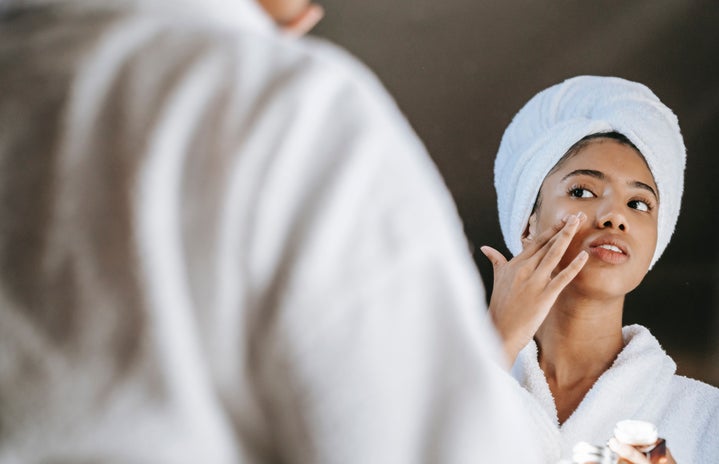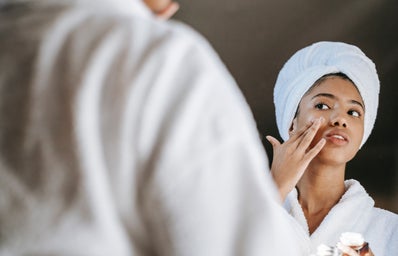I remember my first breakout. I was in eighth grade when the first tiny bump appeared right between my brows one day. The next one appeared on the tip of my nose, the night before picture day at school, except it came in the form of a giant cyst that refused to pop and only became an angry shade of red when I tried to. I was so desperate to get rid of the zit that I made it much worse in an attempt to pop it, and it left a prominent scar that lasted for years—even now, almost seven years later, I can still see a faint circular indentation.
I’ve dealt with acne like every other teenager, but with social media constantly depicting people with flawlessly clear skin, it was hard to embrace my skin as it was. I broke out on my forehead first before it spread to my cheeks, and with my horrible habit of face-picking, it often left behind hyperpigmentation—a lasting, tangible reminder of my anxiety over my skin. On top of the pesky bumps on my face, I struggled with insecurity when I began associating my appearance with my self-worth. I’ve spent so much time trying to find a solution for getting rid of my acne. If I had to guess, I’ve probably watched at least a hundred hours’ worth of YouTube videos depicting various people’s skincare routines and product reviews. I spent even more money buying different skincare products, undergoing months and years of trial and error to see which ones yielded the best results. I’ve tried everything—all the products people claimed to be their holy grail to curing their acne, all the diets that claimed to rid of breakouts as long as you drink water or cut out dairy from your life.
Despite everything I did, I still broke out. Every pimple that formed led to another piece of my self-worth crumbling. As someone who grew up in a time where social media was first becoming a thing, I had watched people put out their best selfies on Instagram—most of which showed them with clear and perfect skin, and not a single bump or pore in sight. While I knew that some people weren’t sharing their true selves when it comes to Instagram, it didn’t stop feeding into the feeling of insecurity I had over my skin. Coming across so many people on my feed with “perfect” skin made me hesitant to put my face out there, even on my best days when the flare-ups weren’t as bad. Consequently, if I was out in public, you wouldn’t have caught me dead without any makeup on, even at the pool or the beach.
I’ve come a long way since those days of insecurity. It was not an easy journey, of course, but towards the end of high school and the beginning of college, I began embracing the imperfections and became more comfortable with being barefaced in public. At some point, I was tired of being stuck in this downward spiral, being obsessed and anxious with what people would think of me for having less than perfect skin. Instead of focusing my attention on the perfect Instagram models, I started looking at the people who were more honest about their imperfections, who were more open to speaking about the real experiences of having acne. It was like a breath of fresh air for me. The best thing about hearing people speak honestly about having acne is that it inspires others to stand up and say, “I deal with this, too.” It creates a ripple effect where more and more people will join the conversation, giving comfort to those who were unwilling to speak at first because they felt like they were utterly alone in the experience.
It was these people that helped me break out of my shell for the first time. I finally felt comfortable enough to go lighter on the makeup and eventually go makeup-free. It was also nice to see my skin beginning to clear up for the first time, but some of my dark spots remain. But that’s okay. Now and then, I still feel small moments of insecurity when I have a particularly bad breakout, but now I know that what I go through is natural and shouldn’t be something to be ashamed about. I hope to help others feel more comfortable in their skin, just like how certain people have done that for me. By starting a conversation and talking about the mental health aspect of acne, we can slowly but surely change the stigma and show that feeling confident and loving yourself with acne is possible.


